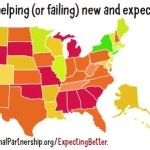Companies leading the way in family leave
PayPal, Amazon, Google, Facebook, Netflix, Microsoft…and the Navy? The tide is turning on family leave and while Silicon Valley is leading the way, many companies and industries that you may not expect are catching up.
In August 2015 Netflix announced an unheard of policy of unlimited paid time off for new moms and dads within the first year of bringing a child home. A day later Microsoft increased its paid leave for new mothers from 12 to 20 weeks and from four to 12 weeks for fathers. Workers at Google receive up to 12 weeks of paid parental leave, while birth mothers are eligible for up to 18 weeks of paid maternity leave. Mothers at Apple can start their maternity leave up to four weeks before the baby is due and continue on paid leave for 14 weeks after the baby is born. Additionally at Apple, non-birth parents are eligible for six weeks paid time off. At Facebook, all parents receive four months of paid parental leave. EBay announced new mothers will get up to 24 paid weeks off at 100 percent of their salaries starting Jan. 1, 2016, compared with 10 weeks of 80 percent pay previously.
Wall Street firms are joining the trend of increasing family leave in benefits packages. Accenture recently increased their maternity leave policy to 16 paid weeks, following similar policies by Blackstone Group LP, Goldman Sachs, Deutsche Bank AG and Morgan Stanley. Goldman Sachs expanded its policy even further, offering secondary caregivers four weeks of paid leave.
Private companies are not the only ones responding to new demands for family leave. The Navy now allows new mothers up to 18 weeks of leave, tripling their previous benefit. The Air Force announced the same leave policy shortly after and the Army is now considering a similar change. And all branches are adjusting the rules around deployment for new mothers.
Tech and Wall Street firms are frequently competing for the best and the brightest workers and expanded family leave policies are helping to attract and retain talent, especially women. These policy changes are proof that if workers care about leave, companies will too. List your leave makes it easy to see where your company stacks up in comparison and helps all employers understand family matters.








Comments (0)